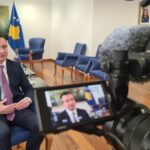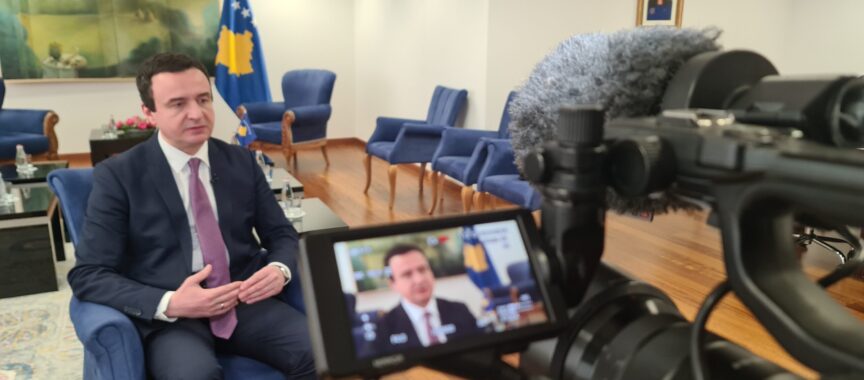Full interview of the Prime Minister of the Republic of Kosovo, Albin Kurti for the Agence France-Presse (AFP)
Question: Mr. Prime Minister, let’s start with the crisis in Ukraine. Russia’s aggression on Ukraine, gives an impression that has shaken, has profoundly endangered the existing security order in Europe, which was established by the fall of the Berlin Wall. Many analysts consider that this is a tectonic shock and our first question is, do you think, is it likely, is there any hope that this system will return, recover?
Prime Minister Kurti: The military aggression and the Russian invasion were shocking, but not surprising. They were not surprising, as we have seen it preparing and building both in terms of political discourse by the Kremlin, but also of gathering large military forces with heavy artillery on the eastern borders of Ukraine. The sights are shocking, it’s hard to believe what we are seeing, but no one can pretend to have been surprised. This is an early warned war, because Russia’s hegemony, Russian imperialism wanted new territories at all costs, wanted expansion and confrontation with the European Union and NATO. The despotic Russian President, Putin is seeking for a new Yalta Conference, but the new Yalta Conference is not possible without war. That’s why we have this Russian aggression and military invasion.
Undoubtedly, the security architecture of the European continent needs to be rethought, because we no longer have the conditions of peace after the fall of the Berlin Wall. The wars, which took place during these three decades across other continents, have now come to Europe, in the shape of confrontation with Russia, which is led by a person who is both very bitter and very nostalgic. We also had wars in the context of violent disintegration of the former Yugoslavia, however, what we are witnessing today is a march of the Russian army, one of the most powerful armies in the world and of the time, and obviously NATO should now increase its mobilization, but also think about how to respond to Russia, in conditions where hybrid war clearly turned out to be not a substitute for the war, but a preparatory phase for it.
Question: The largest state, the largest country in Europe, has been attacked. Even among Western observers it can be heard that they consider this attack, this aggression as an attack on Western civilization. Do you think that this aggression and all the impact that this aggression has created, has made divisions in Europe meaningless, in NATO countries, non-NATO countries, European Union countries, non-European Union countries, that is, everyone is threatened by the same danger?
Prime Minister Kurti: I agree. The differences that exist within the European Union and within Europe as a continent in general, have become secondary issues, if not to say tertiary, against Russian aggression and military invasion in Ukraine. Therefore, if the European Union and NATO do not use this moment to be united, as time imposes, but I also believe the will of people, civil rights and well-being on the European continent, then we will pay very dearly with our future and future of our children.
It is thus necessary to have an increased institutional unity, as it is the people unity. I am convinced that people of Europe have never been more united then now, but this kind of unity must find its expression in both politics and representative institutions.
The European Union must be united, because Ukraine has been attacked, which represents the largest country on the European continent. In other words, there is no other country that with all its territory is on the European continent, and has more than 600 thousand square kilometers, as is the case with Ukraine. So, the farthest eastern state on the European continent is also the largest by its territory and is now under a devastating attack that wants the territory of Ukraine for Russia, but with no Ukrainians in it.
Question: You have mentioned that aggression inflicts unification of Europe, as the first response to this attack on a sovereign and independent European country. Do you think that conditions imposed by Russian aggression is the beginning of creating the conditions for the establishment of a new order of collective security, where all European countries will unite under the same umbrella, regardless of whether they belong or not to the European Union and NATO mechanisms?
Prime Minister Kurti: The Europe and democratic west in general need a coalition, which is a coalition for defense and security, but not only, against the Russian Federation. And, what is happening in the Russian Federation now, Europe can also find in its history.
My strong impression is that the period from Gorbachev to Yeltsin represented only the Russian version of the Weimar Republic. We had a decade of a Weimar Republic in the Russian Federation, and now we have a despotic leader who has turned his war machine against people who neither provoked nor wanted war. In this political and security context, we must respond through a coalition, in which case we should not limit ourselves to the existing formulas of international organizations, but should advance them, and perhaps even create new ones, because the situation is extraordinary.
Question: Is there a reason for Kosovo to feel endangered after the Russian aggression, especially given the relations and high tensions with Serbia, which is considered as Russia’s main ally in the region?
Prime Minister Kurti: The despotic Russian President is seeking a new Yalta Conference. This requires war, and this he did do. But it also requires expansion of the conflict beyond Ukraine, and this he has not done yet. My impression is that Putin wants to sit at the negotiating table with U.S. President Biden and not with Ukrainian President Zelensky. His aim is a new Yalta Conference, Yalta 2, in which case the spheres of interest would be divided and this way the Russian Federation would aim to be compensated for the dissolution of the Soviet Union. Thus, since they will also aim for new conflicts, the Western Balkans in general, and Kosova in particular, are at risk. In the past, the Russian President mentioned us once a month, now he mentions us several times a week, and it is clear that the Republic of Kosova is a fish bone needle that he considers it’s hindering his project. Two months after the liberation of Kosova, in August 1999, the Russian President became Prime Minister of the Russian Federation, whereas on the occasion of the second anniversary of the arrival of Russian troops at Prishtina Airport from Bosnia and Herzegovina in June 1999, he visited Kosova, to pay a visit to Russian troops exactly at Prishtina Airport in June 2001. Let us not forget that, we are talking about the President who annexed South Ossetia and Abkhazia in Georgia, precisely the same year when Kosova declared its independence, while a week after Kosova’s declaration of independence, an agreement was signed between Serbia and the Russian Federation to grant most of the shares of the oil industry in Serbia to Gazprom, and also of the gas basin in Banatski Dvor in Vojvodina, again to Gazprom. Out of 250 MPs in the Assembly of Serbia, 151 of them, namely more than 60 percent, are members of the Serbia – Russian Federation friendship group. There are a dozen of MPs in the Assembly of Kosova in friendship groups with different countries. In Serbia, over 60 percent of the Assembly members are in the friendship group with the Russian Federation. Adding the fact that Russia has been very active in Serbia for more than a decade, especially through the so called “Russian Humanitarian Center” in Nis, and Sputnik which has its regional headquarters in Belgrade, of course we should to be very vigilant, careful, but we will never be afraid of them.
Question: There has not been a single statement of Kosovo’s top leaders since the outbreak of the crisis in Ukraine; at least I have not heard of, where they don’t appeal for Kosovo’s accession to NATO. Do you think that the Balkans as a traditional area of Russian interest could be Russia’s next target after it ends the conflict in Ukraine?
Prime Minister Kurti: In best case scenario, we can say that the Russian President is unpredictable. In reality he is predictable. He is a leader of war, not of peace. He is interested in taking all of Ukraine. If he cannot take all of it, then at least he will try to divide it like Bosnia, turn Kiev into a Grozny or second Sarajevo, and also spread the conflict elsewhere, where he will use the factors and actors whom he controls also in the Western Balkans. In this extraordinary situation, we cannot behave in ordinarily fashion. Therefore, both membership in the European Union and membership in NATO cannot be made through the old ways.
It is imperative that Brussels, as a double capital city of both NATO and the European Union, rethink a new way of internal integration and enlargement in the Western Balkans. The Western Balkans, and Kosova at the heart of this Western Balkans, is part of the European continent. In case of EU and NATO membership, the external border of these two most important peace bodies since the end of World War II, reduces by about 3 thousand kilometers, which means that it is much better also for security purposes.
The six Western Balkans countries that are still not integrated into the European Union, in terms of population, are approximately as large as the Netherlands, and in terms of combined gross domestic product, are approximately as large as Slovakia. Consequently, the accelerated integration of our region is not a big burden for the European Union.
Question: So, you think that the emergency of this situation imposes the emergency in the procedure of accession, enlargement of NATO and the European Union?
Prime Minister Kurti: The old methods of NATO and the European Union enlargement can have very high cost after the Russian aggression and military invasion in Ukraine, which I believe is not going to stop only in Ukraine.
Question: And finally, Kosovo and Ukraine have no diplomatic relations. Ukraine does not recognize Kosovo’s independence, but Kosovo’s support for Ukraine so far, politically, morally, financially under these modest conditions of Kosovo, has made Kosovo, at least that’s what the impression is, a leaders in the region in support of Ukraine. Where does this solidarity for a country that has not recognized Kosovo come from?
Prime Minister Kurti: In the defensive and liberation war of the people of Ukraine, we find many similarities with our situation a quarter of a century ago, where a much larger northern neighbour wants to occupy you, oppress you, exploit you, discriminate against you, establish apartheid and also tries to commit genocide, which started in Kosova, but was stopped by NATO intervention, preventing this way the extermination of Albanians from our country. In other words, we had on one side the Kosovo Liberation Army, which initiated the resistance and fight for liberation and freedom, and this raised the awareness of the international community and world’s diplomacy in supporting us. No one like the people of Kosovo sees the similarity of what has happened to us in our lives, not in the history books, but in our life time, with the current context in Ukraine, where the defensive and liberation war of the people of Ukraine is finding solidarity and tremendous admiration in the democratic western world, as in ours during 1998 and 1999.
Last modified: August 11, 2022

